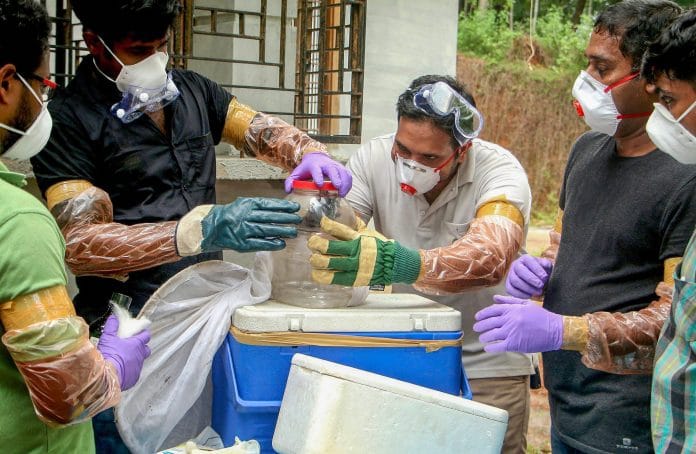Fruit bats are the natural host of the Nipah virus; 2 persons are critical and 9 are under surveillance in Kerala hospitals.
New Delhi: The Kerala government Tuesday confirmed 10 deaths from Nipah virus infection even as the country’s food safety regulator constituted a team of 30 officials to check fruits and vegetables sold across the state.
Two persons are stated to be critical and nine are under surveillance in hospitals.
“However, no new case has been reported in the past 24 hours,” K.K. Shylaja, Kerala health minister told reporters.
According to the World Health Organization, fruit bats are the natural host of the Nipah virus.
“While these (food safety) inspectors will do the manual checking of fruits and vegetables to find bat bites, they will also collect samples of ‘clean fruits’ for the further testing in the laboratories,” M.G. Rajamanickam, food safety commissioner at Food Safety and Standards Authority of India (FSSAI), Kerala, told ThePrint.
FSSAI, an autonomous body under the health ministry, is also suspecting the role of water in the spread of the disease further.
“We are also testing water samples,” Rajamanickam said.
“It is widely advised to wash fruits and vegetables before consuming. But what if the water itself is contaminated by bat excreta or saliva?” Rajamanickam asked.
Current status
Nipah virus (NiV), according to doctors, is a newly-emerging zoonosis (a disease which can be transmitted to humans from animals) that causes severe disease in both animals and humans. There is no effective antiviral therapy for this infection.
“Once the symptoms begin, there is an increased likelihood of the person going into a coma just two days after getting infected,” said Dr K.K. Aggarwal,former president of the India Medical Association.
“The first line of defence is to avoid exposure and quarantine those who have already contracted the virus,” he added.
How it was detected
Investigators from the National Centre for Disease Control (NCDC) found many bats in the well of the house in Perambra in Kerala from where the initial death was reported.
A few of them were caught and sent to the laboratory to confirm whether they are the cause of the disease or not.
Officials have now sealed the well.
Dr Devendra Sehra, senior consultant, General Medicine at Maharaja Agrasen Hospital in Delhi said that people coming from Kerela must be investigated as symptoms of Nipah virus infection is similar to that of swine flu.
“The initial presentation is non-specific, characterised by the sudden onset of fever, headache, muscle pain, nausea and vomiting. Neck rigidity and photophobia are also observed,” said Dr Sehra.
The infection is diagnosed through ELISA test, carried out by the National Institute of Virology, Pune.
With inputs from Rahiba R. Parveen






